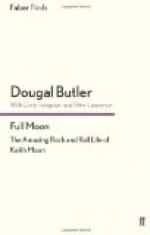That conclusion carried another in its wake. If Robert Turold had not safeguarded his dearest ambition because he hoped to carry it out himself, it followed as a matter of course that he did not take his own life. Mr. Brimsdown had never accepted that theory, but it was strange to have it so conclusively proved, as it were, by the inference of an omission. That brought the lawyer back to the position that some foreboding or warning of his murder had caused Robert Turold to summon him to Cornwall by letter. The next step of his investigations led Mr. Brimsdown to the dead man’s study, where that frantic appeal had been penned.
He engaged a vehicle at the hotel and drove over to Flint House in the afternoon. The impression of that visit remained. Flint House, rising from the basalt summit of the headland like a granite vault, its windows coldly glistening down on the frothy green gloom of the Atlantic far beneath, the country trap and lean black horse at the flapping gate, the undertaker’s man (dissolute parasite of austere Death) slinking out of the house, and Thalassa waiting at the open door for him to approach—all these things were engraved on Mr. Brimsdown’s mind, never to be forgotten. Who was it that had staged such a crime in such a proscenium, in that vast amphitheatre of black rocks which stretched dizzily down beneath those gleaming windows?
Then came other impressions: the dead man upstairs, the disordered dusty study, the stopped clock, the litter of papers. It was in the room where Robert Turold had been murdered that Mr. Brimsdown questioned Thalassa about the letter, and heard with a feeling of dismay his declaration that he had not posted it. Where was the nearest pillar box? Nearly a mile away, at the cross-roads. Could his late master have gone there to post it that night? If he had, Thalassa hadn’t heard him go out. Could anybody else have posted it? No; there was nobody else to post it.
It was like questioning a head on an old Roman coin, so expressionless was Thalassa’s face as he delivered himself of these replies. But the lawyer had the feeling that Thalassa was deriving a certain grim satisfaction from his questioner’s perplexity, and he dismissed him somewhat angrily. Then, when he had gone, he turned to an examination of some of the papers and documents which littered the room, but that was a search which told him nothing.
When the shades of evening warned him to relinquish that task, he told himself that he really ought to go and see Austin Turold before returning to Penzance. But he shrank, with unaccountable reluctance, from the performance of that obvious duty. He felt very old and tired, and his temples were throbbing with a bad nervous headache. He therefore decided to postpone his visit to Austin Turold until later.
CHAPTER XX
When the interview with Austin Turold did take place, Mr. Brimsdown learnt with a feeling which was little less than astonishment that Robert Turold had died without confiding to his brother the proofs, on which so much depended, of the statement he had made on the day of his death.




